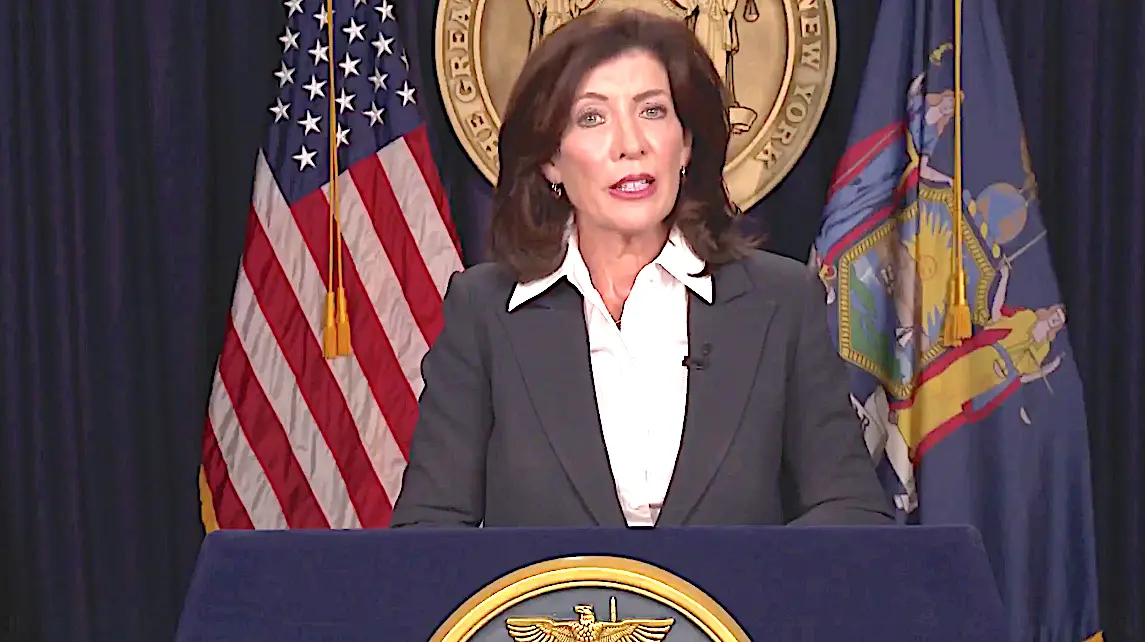Reaction to Hochul ordering indefinite delay for congestion pricing
Gov. Hochul’s announcement yesterday that she has directed the Metropolitan Transportation Authority (MTA) to indefinitely delay the start of congestion pricing has brought reaction from both advocates of the plan to funnel $1 billion a year to the MTA as well as opponents. Congestion pricing involves a new $15 toll on private cars traveling below 60th Street in Manhattan and higher tolls for trucks. Hochul said she is concerned about costs faced by New Yorkers and whether the congestion tolls would contribute to people working from home, thereby hurting businesses in New York City.

In reacting to Hochul’s announcement, the Regional Plan Association said, “Delaying congestion pricing will hurt millions of transit riders across the region who rely on subways, buses and commuter rail every day. It will delay critical investments in the system, including faster service, new trains, station upgrades, bus electrification and the jobs they bring. It will condemn our communities to many more years of crushing traffic and polluted air.”
Yonkers Mayor Mike Spano backed Hochul’s decision, saying, “I applaud Gov. Hochul for examining the consequences and impact congestion pricing would have on New Yorkers. We know many of our City of Yonkers residents work in New York City and the extra tolls would not have been sustainable or efficient for them.”
Dutchess County Executive Sue Serino praised Hochul’s decision. Serino said, “I have long been opposed to congestion pricing and the burden it would place on Hudson Valley residents. Now is not the time to add extra costs to our neighbors as they are still trying to survive and bounce back from the affordability crisis we are in.”
“Gov. Kathy Hochul should not just pause this plan but eliminate it entirely,” Rockland County Executive Ed Day said. Day has been a vocal opponent of congestion pricing and said Rockland would continue its court challenge of the congestion pricing plan.
“Rockland’s approximately 4,000 residents who drive into the CBD (central business district) – many of whom are first responders – are forced to do so because there is no one-seat-ride, despite our more than $40 million annual value gap between what we pay and what we receive from the MTA,” Day said. “We have fought this ridiculous tax from day one and applaud fellow lawmakers, including those in New Jersey, Long Island, and Staten Island, who are in that fight as well.”
Congressman Jerrold Nadler of New York’s 12th Congressional District, said, “As a longtime champion of congestion pricing … I am disappointed. After years of delays, we need congestion pricing now more than ever to reduce paralyzing vehicle traffic in the CBD, improve air quality in our city and region, and raise desperately needed capital funds to enhance the public transit system that millions depend on.”
In her announcement, Hochul said that a $15 charge may not seem like much to someone who has the means but it can really hurt many families. She said that she is committed to funding for the MTA’s needs and is currently exploring other funding sources to replace the congestion pricing revenues that were to be used to pay for improvements to the transit system.
She said that traffic congestion in Manhattan will be tackled in ways other than congestion pricing. She pointed out that when congestion pricing was in the formative stages five years ago economic circumstances were different.
“After careful consideration I have come to the difficult decision that implementing the planned congestion pricing system risks too many unintended consequences for New Yorkers at this time,” Hochul said. “For that reason, I have directed the MTA to indefinitely pause the program. The goals of congestion pricing in terms of reducing traffic and pollution are important. But, hard-working New Yorkers are getting hammered on costs.”
Congestion pricing had been due to start on June 30. The E-ZPass and license plate readers that would be used to identify vehicles and provide data to collect the tolls already have been installed in Manhattan.
There have been reports that Hochul was pressured by House Minority Leader Hakeem Jeffries to block the start of congestion pricing before the November elections because of concerns that the new tolls would result in a loss of votes for Democratic candidates for Congress.